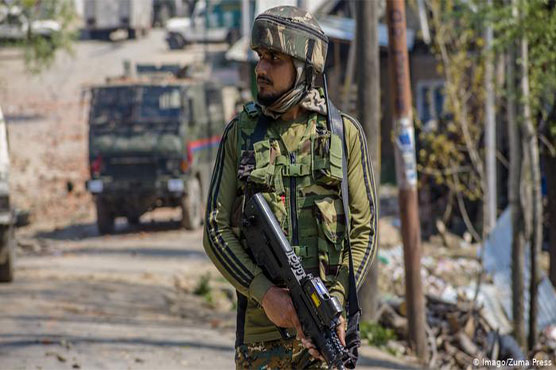Families dispute India claims slain youths were Kashmir rebels

Police said the trio were killed in a 20-hour gun battle on the outskirts city of Srinagar.
SRINAGAR (AFP) - Families of two teenage boys and a young man killed in Indian-administered Kashmir Wednesday by government forces during an alleged firefight have denied they were militants -- a rare protest in the restive Himalayan region.
Police said the trio were killed in a 20-hour gun battle on the outskirts of the region s main city of Srinagar after they were cornered inside a home on Tuesday.
"Repeated announcements were made to the hiding terrorists to lay down their illegal weapons and surrender," police said in a statement.
"Instead, the hiding terrorists fired continuously upon the searching party."
But relatives of the trio disputed the story and protested outside a police building in Srinagar where the bodies were being kept.
"Yesterday at 10 in the morning, he had tea with me," Bashir Ahmad Ganai, the grandfather of one of the slain youths, Aijaz Maqbool, told reporters.
"We don t know where he was picked up from and later killed. What is going on in Kashmir?" Ganai said.
The families of the other two -- high school student Athar Mushtaq and carpenter Zubair -- also insisted they were innocent.
Parents of the students said they had been on their way to receive private tutoring in Srinagar.
But police insisted two of them were "hardcore associates of terrorists" and the third might have recently joined rebel ranks.
The exact ages of the three killed were not released.
The case bears similarities to a July incident in which three labourers were killed, sparking an outcry in the region, which is also claimed by Pakistan.
The army had claimed that those three men were killed in a gun battle in the village of Amshipora, and that weapons were found on them.
But on Sunday, an Indian army officer and two associates were charged with planting weapons on the bodies to make it look as though they were militants.
Rebel groups have been fighting Indian soldiers since 1989, demanding independence or a merger of the territory with Pakistan.
The fighting has killed tens of thousands of people -- mostly civilians.
Since January, at least 180 militants have been killed by government forces, according to an AFP tally.
Rights groups say cash rewards given to government forces for killing alleged terrorists and emergency military laws help perpetuate rights violations. Authorities deny the claims.
Under the Armed Forces Special Powers Act, government forces deployed in the region cannot be tried in a civilian court unless New Delhi agrees.
No such permission has been granted in the last three decades, despite dozens of requests by police after investigations into actions by security forces.

